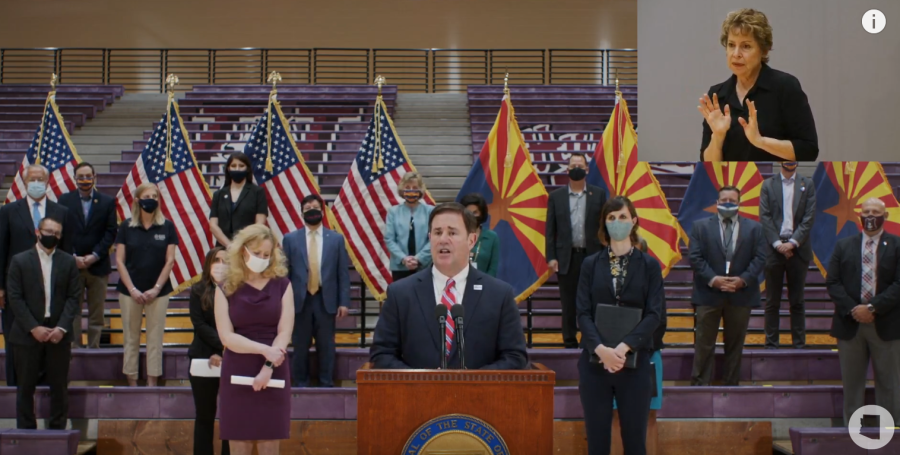Arizona Governor Doug Ducey held a briefing Sept. 10 on suicide prevention and mental health during COVID-19 with other state health and education officials. September marks suicide prevention month around the world, with Sept. 10 being World Suicide Prevention Day.
Suicide in Arizona has been a steady problem, only worsened by isolating pandemic restrictions detrimental to the mental health of thousands of Arizonans. Nationwide, Americans reporting thoughts of suicide have increased to 1 in 10 over the last 30 days, nearly double rates from previous months. Last year, over 1,500 Arizonans died due to suicide.
Governor Ducey, alongside public health and education leaders identified that suicide in the state is worse for certain demographics, especially Arizona’s youth.
“The leading cause of deaths for our youth, ages 10-14 is suicide” Ducey said in the briefing. “And that’s an absolute tragedy.”
According to Dr. Cara Christ, Director at Arizona’s Department of Health Services, over 40% of Arizona students reported feeling sad or hopeless every day for over two weeks or more (3% higher than the national average of 37%), 21% have contemplated suicide, 16% have made a plan, and 10% have actually attempted.
To Christ, “the data not only shows critical need to teach coping strategies and increase mental healthcare access for our youth…but shows the need to Promote protective factors like financial resources and protective services.”
Kathy Hoffman, state superintendent of public instruction was quick to see the need for more mental health services in schools.
“My view is that every school should have a counselor and a social worker,” Hoffman said. “I would like to see continued investment in these programs.”
Ducey also said that resuming in person instruction would help Arizona’s youth who are currently facing mental health problems while living at home.
“We believe the inside of a school environment is safe, for counselors’ teachers and students to identify and assist mental health problems,” he said. “There students can access those services … for abuse and for help for mental health issues.”
Christ concurred, identifying how online models of learning can lead to increased risks of bullying, “as we do more virtual learning there is also an increase in levels of cyber bullying,” she said.
Jami Snyder, Director of Arizona’s Health Cost Containment System, the state’s Medicaid agency, also identified the ways in which Arizona is treating mental health and preventing suicide in public schools. AHCCCS is partnering with the department of education for a “Train the Trainer” program to help train more public educators to identify those at risk for suicide, and take the proper steps to prevent and treat mental health issues.
Governor Ducey also applauded Arizona state legislators Kate Brophy McGee and Jeff Weninger for the passage of Jake’s Law, a May bill signed into law that requires health care insurers to cover mental health without added barriers. A Suicide Action Plan created by Christ and the Arizona DHS was also amended as an effort to collect and gather more data on suicide causes and methods of prevention.
RELATED: Arizona partners with WeWork, expanding UA Global Microcampus Network
Air Force Colonel Wanda Wright, Director of Arizona’s Department of Veteran Services also identified how suicide is affecting Arizona’s veteran community, and how the state is working to prevent veteran suicide.
According to Wright, the amount of veteran suicides increased on average 6,000 deaths per year from 2008 to 2017. However, Wright and the Department of Veteran Services has created a “Be Connected” service that already has completed 30,00 encounters, connecting veterans to mental health resources.
While the briefing focused on suicide prevention, Ducey and his colleagues did field some questions related to COVID-19 and state relief funding.
Ducey responded to one question, putting blame on inaction of Washington politicians, “we are calling on congress to act…they should stop playing partisan politics and get back to work,” he said.
If you or a loved one are having, suicidal thoughts, ideations or plans, call the National Suicide Prevention Lifeline at 1-800-273-8255, or text HOME to 741-741.
Follow Ian Tisdale on Twitter









